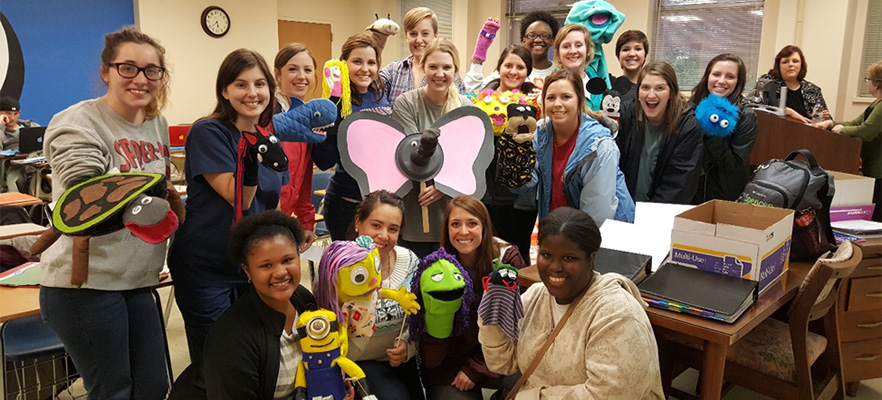COLLEGE OF APPLIED & NATURAL SCIENCES
Human Development and Family Science
Human Development and Family Science is designed for students who have a passion for working to improve the lives of children, youth, and families through direct interaction and application of their specialized knowledge in one of three concentrations: Child Development Specialist, Child Life, or Family Sciences.
The Child Development Specialist concentration focuses on understanding children and their physical, cognitive, and social-emotional needs. The Child Life concentration is designed to provide a strong undergraduate foundation for students who will pursue internships to become eligible to be a certified child life specialist and work with children and families in medical settings. The Family Science concentration provides students with knowledge and skills needed for careers focused on helping individuals, couples, and families enhance their lives and build stronger relationships across the entire life course.
The Human Development and Family Science program is accredited by the American Association for Family and Consumer Sciences and the Family Science program is an approved program for the National Council on Family Relation’s Family Life Educator certification.
Career Opportunities
- Child Life Specialist
- Early Childhood Educator
- Certified Family Life Educator
- Nonprofit Administrator
- Children’s, Youth, and Family Minister
- Cooperative Extension Agent
- Gerontologist
- Adoption Specialist
- Case Manager
- Child and Family Advocate
- Child Welfare Specialist
- Family Financial Advisor
- Family Support Coordinator
- Forensic Interviewer
- Grant Manager
- Nonprofit Fundraiser
- Outreach Coordinator
Entry-level salaries average from $30,000 to $55,000, depending on choice of career.
Graduate school opportunities
Many students completing this concentration pursue graduate studies in family studies, child development, counseling, psychology, social work, marriage and family therapy, gerontology, early intervention, or seminary.
Child Development Specialist Concentration
The Child Development Specialist Concentration prepares students to work with children from birth through adolescence in a variety of settings. This is not a teacher certification program, but it does prepare students for the opportunity to obtain teaching credentials.
Child Life Concentration
The Child Life Concentration prepares students to become child life specialists. Graduates must complete an internship and pass a national certification examination to become Certified Child Life Specialists (CCLS). This academic program lays the groundwork for that certification.
Family Science Concentration
Program Highlights: Prepares students to work with families in a variety of settings, including Upon completion of the undergraduate degree and course requirements, graduates are eligible for certification as a Certified Family Life Educator through the National Council on Family Relations.

Scholarships
Contingent upon student application and academic performance, students in the Human Development and Family Science program may receive Human Ecology scholarships, Louisiana Tech scholarships, Taylor Opportunity Program scholarships, as well as federally funded scholarships.
Required field experience
Prior to graduation, every student will complete a minimum of 240 clock hours of supervised field experience related to a declared concentration. Students are required to complete these hours at two or more approved external sites. The sites are selected by the student with the consultation and approval of the student’s academic advisor and the Human Development and Family Science Practicum Coordinator. There is an addition $150 fee for enrollment in practicum.
Research and outreach opportunities
Through the Education and Research in Children’s Health (ENRICH) Center as well as individual faculty research labs, Human Development and Family Science students are engaged in various research and outreach opportunities. These opportunities include aiding in implementation of evidence-based programs in schools, community organizations, geriatric facilities, etc. Also, students can participate in data collection and dissemination (through conferences presentations and manuscripts).